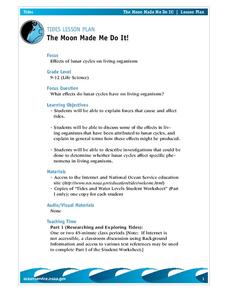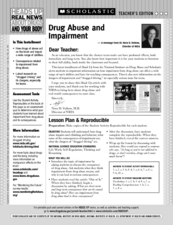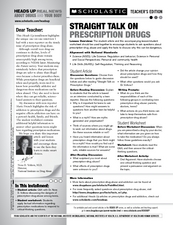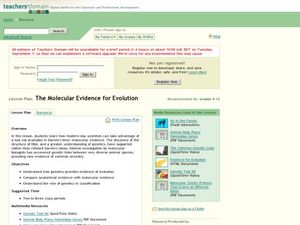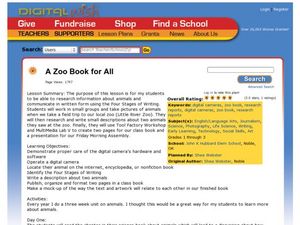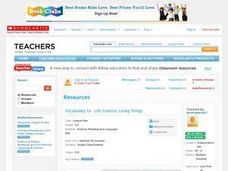Curated OER
Endangered Relationships
Students study the interrelationship between the horseshoe crab and red knot. In this ecology lesson, students explain why several species became extinct. They research about endangered species found in their region.
Curated OER
The Moon Made Me Do It!
High schoolers research about how lunar cycles affect living organisms. In this biology lesson, students prepare an oral presentation of their research results and analyses. They explore the forces that affect tides.
Scholastic
Drug Abuse and Impairment
Students discuss the consequences of abusing drugs. In this drug awareness lesson, students complete a worksheet to find out how much they know about the danger of drugs. They suggest ways to avoid this situation.
Scholastic
Straight Talk on Prescription Drugs
Young scholars discover how doctors custom fit prescription drugs to patients. For this health science instructional activity, students explain the risks associated with drug abuse. They discuss common myths about prescription drugs.
Curated OER
Plants and Animals
Students find common needs between plants and animals. In this plants and animals lesson students compare that both plants and animals need food and water. They also find the differences between plant and animal needs.
Curated OER
Caution: Do No Bleach!
High schoolers explore coral reef bleaching. In this coral reef lesson, students identify the benefits of coral reefs and the 3 major treats to coral reefs. High schoolers research how to lessen the threats and discuss the actions that...
Curated OER
3rd grade life science
In this life science worksheet, 3rd graders answer multiple choice questions about plants, birds, habitats, and more. Students complete 20 questions.
Curated OER
Oh, What a Tangled Web We Weave
Fifth graders investigate the food chain by viewing video clips. In this food web lesson, 5th graders investigate populations and ecosystems by viewing a video in class as well as visiting web sites. Students utilize the Internet to...
Aquarium of the Pacific
Ecosystem Comparison
Fifth graders examine plants and animals in two ecosystems and compare them. In this ecosystem survival lesson, 5th graders compare and contrast a coral reef and kelp forest ecosystem. Students investigate the abiotic and biotic factors...
Curated OER
Comparison of Normal vs Mutant Zebra Fish Embryos
Young scholars observe and study mutations. In this mutations lesson, students work in groups to complete observation tables of various mutations of the zebra fish embryos. Groups give presentations about their observations.
Curated OER
Pumpkins-Life Cycle of a Plant
In this lesson, Pumpkins-Life Cycle of a Plant, students study the life cycle of a pumpkin. Students will analyze the pumpkin and how it goes from seed to pumpkin over a three days of activities. Students sing a song teaching them about...
Curated OER
Invertebrates
For this science worksheet, students answer the problems that are related to the concept of invertebrates. The first question has the ordering of and sorting of invertebrates.
Curated OER
Life Systems- Interacting Organisms
Participate in a life science unit that examines the relationships of living organisms to each other and to their environment as well as the student's role in the cycle of life. Through hands-on activities, research, and scientific...
Curated OER
What do Earthworms Like to Eat?
Students encounter three ecosystems for earth worms prior to performing an experiment. It will introduce students to one form of ecosystem as well as demonstrate how earthworms and the foods they eat affect the environment in which they...
Curated OER
The Molecular Evidence for Evolution
Students discover the structure of DNA, and determine how genetics have supported rather than refuted Darwin's ideas.
Curated OER
Human Evolution
Students investigate hominid evolution to learn the difference between a relative and an ancestor. They study the emergence of bipedalism and the related physical adaptations and cultural ramifications, and chart patterns of hominid...
Curated OER
How Evolution Works
Learners discuss the evolution of the eye and how a complex organ can evolve through natural selection. They research genetic variation, adaptation, and sexual selection. They analyze data to determine how beak length of Gal??pagos...
Curated OER
Deep Time
Young scholars compare geologic time periods to the calendar year. They set up a live-action student timeline in the classroom.
Curated OER
Evolutionary Arms Race
Students recognize that a connection exists between an organism's physical and behavioral traits and its environment. They explore and define different types of interactions that can occur between organisms.
Curated OER
A Zoo Book for All
A visit to the local zoo launches an integrated life science/ language arts research project into the habitat, feeding habits, offspring, lifespan, and other interesting facts about animals. Each group selects two animals to photograph...
Curated OER
Leeches: Who Knew?
The answer key to a page of questions about a children's reading on leeches, this resource is missing its companion text. However, the questions could be used with any age appropriate reading about leeches. Readers make predictions,...
Curated OER
Squid Dissection
First graders participate in dissecting a squid. They identify and locate specific parts of a squid with teacher guidance. They draw a picture of what their squid looked like and label specific parts.
Curated OER
Vocabulary 1a: Life Science: Living Things
Life science vocabulary comes alive through repeated exposure. With the instructor, words are defined and posted in the classroom. Learners repeat the definitions in their own words and review them often. Extension ideas and links are...
Curated OER
Modern Reptiles Concept Map
In this life science worksheet, students complete a concept map on modern reptiles. They answer 13 fill in the blank questions using words from the list.



